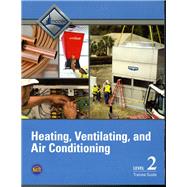This exceptionally produced trainee guide features a highly illustrated design, technical hints and tips from industry experts, review questions and a whole lot more! Key content includes: Alternating current, Compressors, Refrigerants and Oils, Leak Detection Evacuation Recovery and Charging, Metering Devices, Heat Pumps, Basic Maintenance, Chimneys Vents and Flues, Sheet Metal Duct Systems, Fiberglass and Fabric Duct Systems, Commercial Airside Systems, Air quality Equipment, and Introduction to Hydronic Systems.
Instructor Supplements
Instructors: Product supplements may be ordered directly through OASIS at http://oasis.pearson.com. For more information contact your Pearson NCCER/Contren Sales Specialist at http://nccer.pearsonconstructionbooks.com/store/sales.aspx.
- Instructor's Resource's 978-0-13-518532-2
- Access Card ONLY for Trainee Guide (does not include print book) 978-0-13-518704-3
- ELECTRONIC Access Code ONLY for Trainee Guide (must be ordered electronically via OASIS; does not include print book) 978-0-13-518718-0









